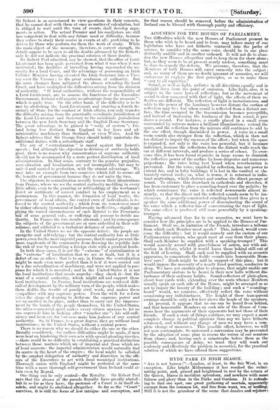ACOUSTICS FOR THE HOUSES OF P A RUA MENT. THE
difficulties which the new Houses of Parliament present to those who wish to be heard and to hear, may induce many of our legislators who have not hitherto ventured into the paths of science, to consider why the same voice should be in one place distinctly audible and in another unheard. It will not do to aban- don the new Houses altogether and to keep them for show alone; but, as they seem to be at present nearly useless, something must be done to remedy the defects. We presume, therefore, that the Members of both Houses will enter earnestly into the subject ; and, as many of them are no doubt ignorant of acoustics, we will endeavour to explain the first principles, so as to make them " easy to all capacities."
Sound, as well as light, radiates in all directions equally and in straight lines from the point of emission. Like light, also, it is subject to the same laws of reflection; but as the movement of sound is slow compared with that of light, the effects of their re- flection are different. The reflection of light is instantaneous, and adds to the power of the luminary however distant the suritoe of reflection may be ; but when sound is reflected from a distant sur- face, the time occupied in the transmission becomes perceptible, and instead of increasing the loudness of the first sound, it pro- duces a second. For instance, a candle placed in a small room surrounded by mirrors makes a brilliant illumination; extend the space, and the reflection from the mirrors still continues to add to the one effect, though diminished in power. A voice in a small room sounds also stronger from the reflection, which is then not too distant to impair the oneness of the effect ; but when the space is expanded, not only is the voice leaspowerful, but it becomes indistinct, because the reflections from the distant walls reach the ear at different intervals, and produce a series of echoes. To over- come this, it has been found requisite in large rooms to diminish the reflective power of the surface by loose draperies and numerous projections ; the voice being best heard when reverberation is prevented. But the voice, unaided by reflection, has not power to extend far, and in lofty buildings it is lost in the vaulted or ela- borately carved roofs ; or, what is worse, it is returned in indis- tinct mutterings which Obstruct and confuse the direct passage of sound. To obviate this drawback in cathedrals and churches, it has been customary to place a sounding-board over the pulpits - by which contrivance the voice is reflected downwards almost in- stantly, so that the direct and the reflected sounds seem to be iso- ehronous. A properly-constructed sounding-board thus gives to a speaker the same additional power of disseminating the sound of his voice which a reflector has of concentrating the rays of light. The same effect is produced still more powerfully by a speaking-. trumpet.
Having advanced thus far in our acoustics, we next have to consider how the principles are to be applied to the Houses of Par- liament. Shall we, in imitation of the French, introduce a tribune from which each Member must speak ? This, indeed, would over- come the difficulty ; but it would scarcely suit the custom of our Parliamentary orators, who speak most at ease from their places.' Shall each Member be supplied with a speaking-trumpet? This would scarcely accord with gracefulness of action, nor with ani- mation in debate, whilst it would leave those behind still ont of the field of hearing. Shall each seat be supplied with an aeoustic apparatus, to concentrate the feeble sounds into honourable Mem- bers' ears ? Much might be said in support of this plan ; but it would impose the necessity of a nearly fixed position, conducive to sleep. We have yet another plan to propose, that might enable our Parliamentary orators to be heard in their new halls without dis- turbance of their ordinary habits. Sound-reflectors of plate-glass, about four yards wide, extending over the seats -salience Members usually speak on each side of the House, might be arranged so as not to impair the beauty of the building ; and such a " sounding- board" would, we conceive, effectively reflect the voice without occasioning any indistinctness. The height of these transparent awnings should be only a few feet above the heads of the speakers. At present, it appears that no one can be heard from behind, and that honourable Members on each side of the House of Com- mons hear the arguments of their opponents but not those of their friends. If such a state of things continue, we may expect a more complete change in political opinions than any we have hitherto' witnessed, and without any change of men we may have a com- plete change of measures. This possible effect, however, we will not now contemplate. So untoward a conversion may he prevented by the adoption of some plan to rescue the voices of our senators from chaos ; and, having such a catastrophe before them as the possible consequence of delay, we -trust they will work out zealously and effectively the problem in acoustics, for the practical solution of which we have offered these suggestions.


























 Previous page
Previous page